A cool and rainy year in the Pacific Northwest has made gardening tough. It’s hard to grow plants without pests getting in the way. This shows how important natural pest control for gardens is.
Natural pest control keeps pests like slugs from destroying plants. Using beer traps and plants like lavender and rosemary can keep slugs away. Also, crushed eggshells and coffee grounds can help stop pests from coming back.
Natural pest control protects the garden and the people who care for it. Pesticides can harm health. Organic and eco-friendly solutions make gardening safer and healthier.
By using natural pest control, gardeners can avoid harmful chemicals. This makes gardening more sustainable and better for the environment.
Key Takeaways
- Natural pest control for gardens is essential to prevent damage from pests like slugs and aphids.
- Organic pest control methods, such as beer traps and plants with strong smells, can deter pests.
- Eco-friendly garden solutions, including crushed eggshells and coffee grounds, can help prevent pest infestations.
- Natural pest control for gardens can provide a safe and healthy environment for gardeners.
- Using natural pest control for gardens can reduce reliance on chemical pesticides and create a more sustainable gardening practice.
- Implementing natural pest control for gardens can lead to long-term garden health benefits and reduce the need for regular pest control.
Understanding the Importance of Natural Pest Control for Gardens
Using non-toxic pest management is key for a healthy garden. It helps gardeners avoid harmful chemicals. Instead, they use safe ways to keep pests away.
This approach is good for the environment and helps protect important insects. It keeps the garden balanced and safe.
Benefits of natural pest control include increased plant vigor and improved soil health. Healthy soil makes plants stronger against pests. This means plants can fight off diseases on their own.
Also, plants can recover from insect damage better. This way, gardeners can grow plants without using harmful chemicals.
Effective natural pest control methods include companion planting and succession planting. Companion planting pairs plants that keep pests away or attract good bugs. Succession planting replaces crops hit by pests with new ones.
By using these methods, gardeners can make their gardens healthy and full of life.
Common Garden Pests and Their Natural Predators
Garden pests can harm plants and lower yields. But many pests have natural enemies that can keep their numbers in check. For instance, aphids can damage plants, but ladybugs and lacewings can fight them off. These natural foes can be drawn to your garden with natural insect repellents and homemade remedies for garden pests.
Some common pests and their natural enemies are:
- Aphids: ladybugs and lacewings
- Beetles: ground beetles and parasitic wasps
- Caterpillars: parasitic wasps and lacewings
- Grubs: beneficial nematodes and milky spore
Using natural insect repellents and homemade remedies for garden pests is a green way to manage pests. For example, a soap spray can be made by mixing dish soap with water. Neem oil, from the neem tree, can also be used as a spray.
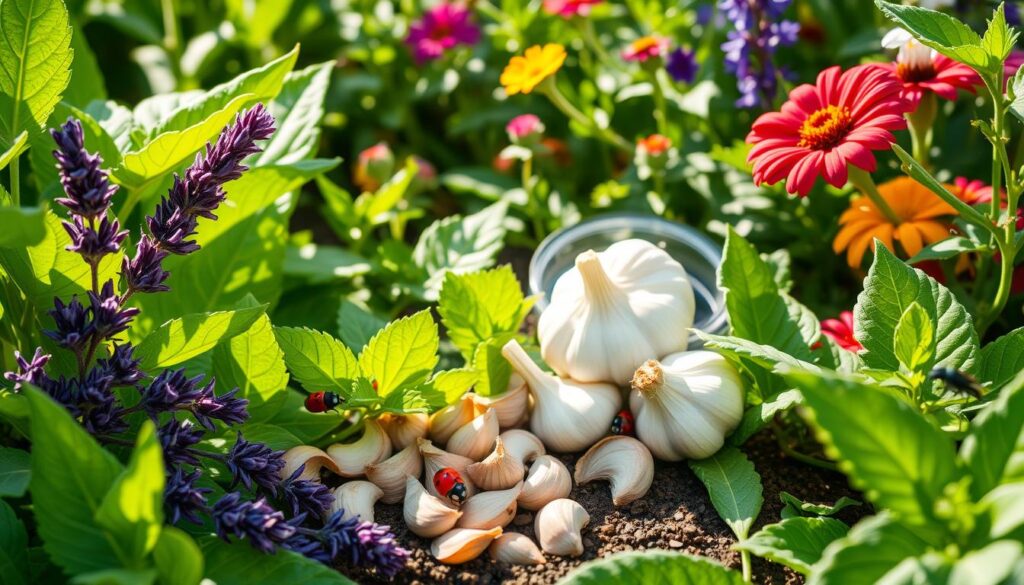
| Pest | Natural Predator | Control Method |
|---|---|---|
| Aphids | Ladybugs and lacewings | Attract them using natural insect repellents and homemade remedies for garden pests |
| Beetles | Ground beetles and parasitic wasps | Use physical barriers and crop rotation |
| Caterpillars | Parasitic wasps and lacewings | Use Bt (Bacillus thuringiensis) and hand-picking |
Essential Companion Planting Strategies
Companion planting is a natural way to keep pests away from your garden. It involves growing different plants together. This method helps create a balanced environment without using harmful chemicals.
Some plants, like marigolds and nasturtiums, repel pests and attract good insects. These flowers can protect other plants from pests. Herbs like mint and basil not only repel pests but also add flavor to food. By mixing these plants, your garden becomes stronger and more resilient against pests.
Best Plant Combinations for Pest Prevention
Some plant pairs are great at keeping pests away. Onions and cabbage together can fight off cabbage worms. Marigolds can stop squash bugs. Basil and thyme can keep yellow striped armyworms and tomato hornworms at bay.
By trying out different combinations, you can find the best pairings for your garden. This way, you can tackle pest problems effectively.
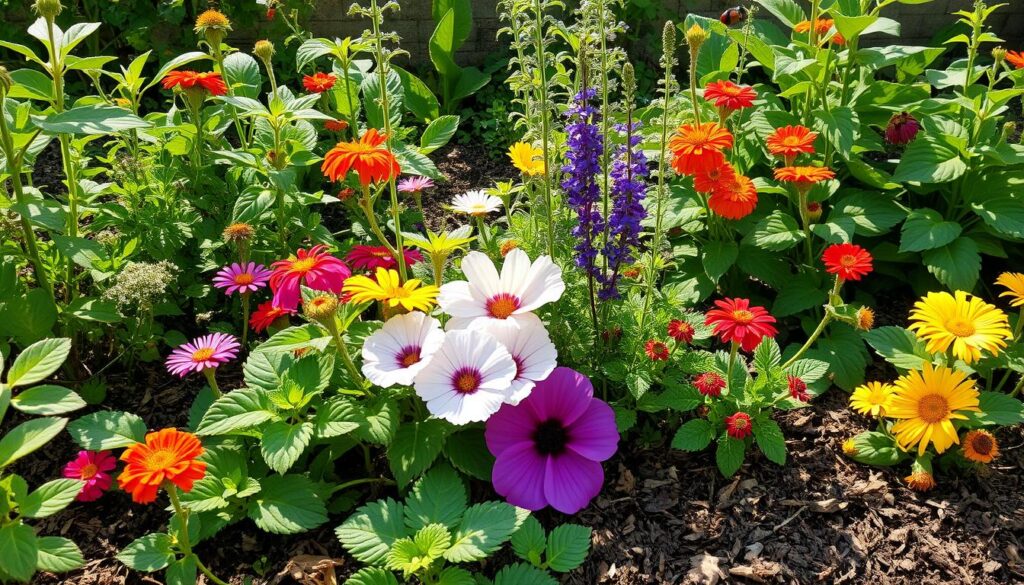
Aromatic Herbs as Natural Deterrents
Aromatic herbs like mint and lemongrass repel pests and make your garden smell nice. Planting them with other plants creates a barrier against pests. Garlic and hot peppers also repel pests and add flavor to food.
By adding these plants to your garden, you create a diverse and fragrant space. This space is better at fighting off pests.
| Plant | Pest Repelled |
|---|---|
| Marigold | Nematodes, whiteflies, and aphids |
| Nasturtium | Aphids, whiteflies, and cabbage worms |
| Mint | Rodents, flea beetles, and aphids |
Organic Barriers and Physical Controls
Non-toxic pest management is key in sustainable gardening. Using organic barriers and physical controls is a great method. For instance, copper tape keeps slugs and snails away. Eggshells stop caterpillars and other pests from getting to plants.
Other physical controls include hand-picking pests and trapping them. You can also set up physical barriers to keep pests from plants. These methods are not only effective but also safe for the environment.
Here are some benefits of using organic barriers and physical controls:
- They are non-toxic and do not harm the environment
- They are cost-effective and can be made from readily available materials
- They can be used in combination with other sustainable gardening practices to create a holistic approach to pest management
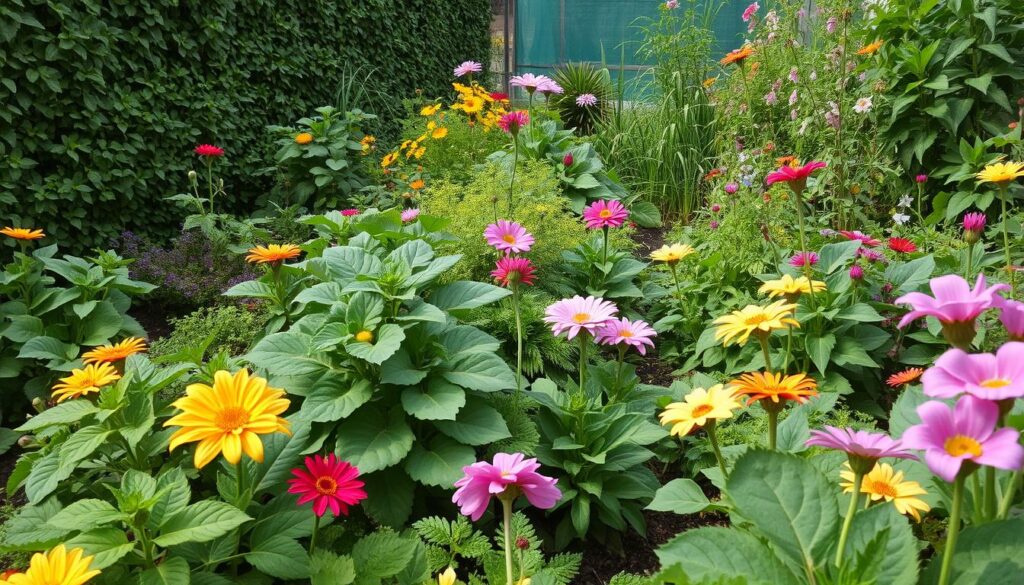
By adding organic barriers and physical controls to your gardening, you can make a healthy garden. This method is good for the environment and your plants. It’s also better for your health.
| Method | Benefits | Materials Needed |
|---|---|---|
| Copper Tape | Deters slugs and snails | Copper tape, scissors |
| Eggshells | Prevents caterpillars and other pests | Eggshells, water |
| Hand-picking | Removes pests from plants | Gloves, bucket |
Natural DIY Pest Control Solutions
Gardeners looking to reduce their environmental impact can use homemade pest control remedies. These alternatives to chemical products help manage pests without harming the garden. Neem oil, made from neem tree seeds, is a key natural insecticide.
To make a neem oil spray, mix two teaspoons of neem oil, one teaspoon of mild soap, and one quart of water. Spray it on plants to control pests safely. Garlic and hot pepper sprays also work, repelling or killing insects with their active compounds.
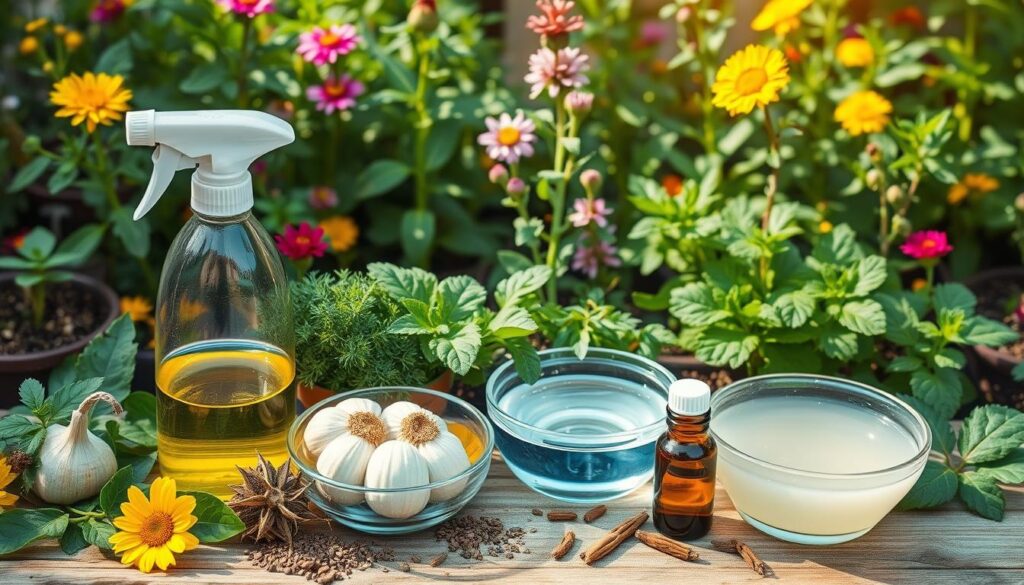
Vinegar-based treatments fight fungal and bacterial diseases. Using these natural methods helps reduce chemical pesticide use. This makes gardens healthier and more balanced. Here are some homemade pest control sprays:
- Garlic spray: puree two bulbs with water, add oil and mild soap
- Chile pepper spray: mix pepper powder with water and mild soap
- Tomato leaf spray: soak fresh leaves in water, strain, and spray
These DIY solutions work well with other safe pest control methods. Companion planting and crop rotation are great examples. Together, they form a sustainable garden management plan.
Biological Control Methods in Garden Management
Biological control is a green way to manage pests in gardens. It’s part of an Integrated Pest Management (IPM) program. This method uses natural enemies like predators and parasites to control pests. By using natural pest control for gardens, gardeners can cut down on chemical pesticides and keep their ecosystems healthy.
Introducing beneficial insects, like ladybugs and parasitic wasps, is a common method. Organic pest control methods like these work well. Gardeners also use eco-friendly garden solutions like microbial pesticides. These are made from natural materials and can fight many pests.
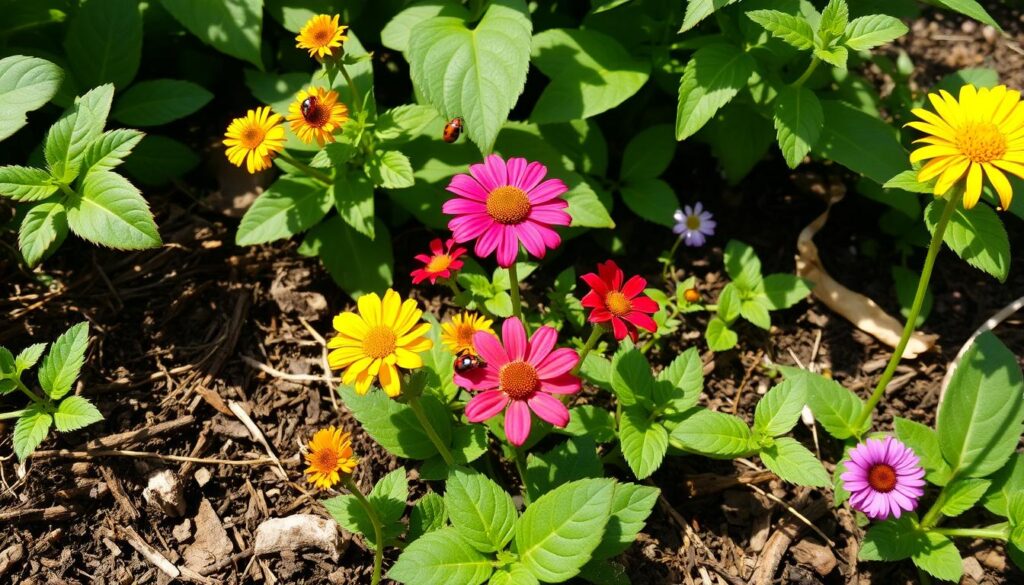
- Introducing beneficial nematodes to control insect pests
- Using predatory insects, such as ladybugs and lacewings, to prey on aphids and other pests
- Applying microbial pesticides, such as Bacillus thuringiensis, to control caterpillars and other insects
By using these eco-friendly garden solutions, gardeners can make their gardens more balanced. This approach reduces chemical pesticide use. It also promotes natural pest control for gardens and keeps the soil healthy.
| Biological Control Method | Pest Controlled | Benefits |
|---|---|---|
| Beneficial Nematodes | Insect pests | Targeted control, non-toxic to humans and pets |
| Predatory Insects | Aphids, whiteflies, and other pests | Effective control, promotes ecosystem balance |
| Microbial Pesticides | Caterpillars, insects, and other pests | Targeted control, environmentally friendly |
Preventive Garden Maintenance Techniques
Keeping your garden healthy is key. Using chemical-free pest control is a great way to do this. It helps keep good bugs like ladybugs around. These bugs can eat up to 50 aphids a day and help the soil.
Crop rotation is a smart move. It means not planting the same crop in one spot for two to three years. This breaks pests’ life cycles and lowers disease risk. Interplanting is another trick. It involves planting strong-smelling herbs with veggies to confuse pests.
Here are more tips for a healthy garden:
- Use fish and seaweed fertilizers once a month to activate soil microbes
- Create habitats for beneficial insects, such as bees and butterflies
- Use floating row covers over young plants to prevent pest damage
- Keep a record of pests encountered, treatments used, and outcomes to strategize for pest prevention
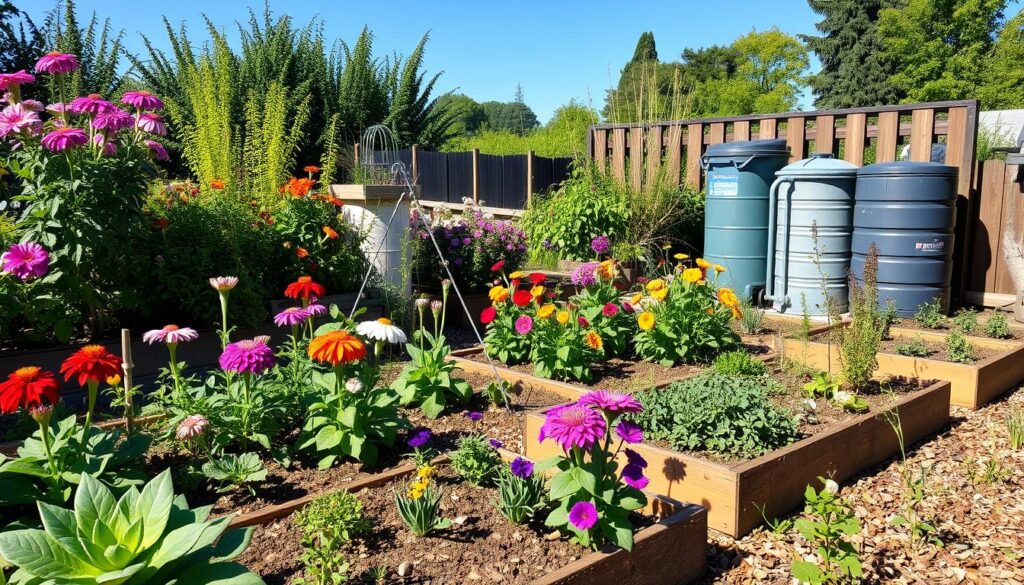
Using these methods, you can make your garden strong against pests and diseases. This not only helps your garden but also makes the world a healthier place.
| Technique | Description |
|---|---|
| Crop Rotation | Leaving 2-3 years between planting members of the same crop family |
| Interplanting | Planting strong-scented herbs among or near vegetables |
| Floating Row Covers | Using covers over young plants to prevent pest damage |
Building Healthy Soil for Natural Pest Resistance
Healthy soil is key to a thriving garden. It helps in non-toxic pest management. By creating a balanced ecosystem, you can use fewer environmentally safe pest control techniques. A balanced soil has 5-10% organic matter, which binds soil, retains moisture, and provides nutrients.
A healthy soil needs about 25% air for insects, microbes, and earthworms. The right mix of large and small pore spaces helps water retention for roots. To achieve this, use composting methods and soil amendment strategies to balance microorganisms. Some effective strategies include:
- Adding organic matter like compost or manure to improve soil structure and fertility
- Using cover crops to attract beneficial insects and reduce soil erosion
- Implementing crop rotation to break disease and pest cycles
By adopting these strategies, you can create a healthy soil ecosystem. This ecosystem is more resistant to pests and diseases. Remember, non-toxic pest management and environmentally safe pest control techniques are vital for a balanced ecosystem. Building healthy soil is a continuous process that requires patience, dedication, and a commitment to non-toxic pest management practices.
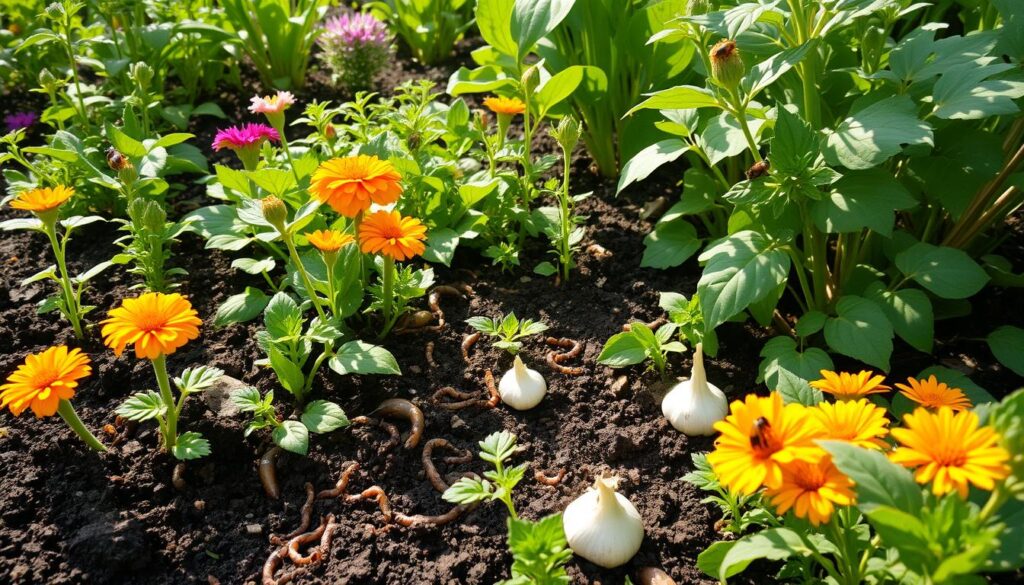
| Soil Type | Characteristics | Benefits |
|---|---|---|
| Sandy | Large air spaces, poor water retention | Good for root growth, but may require more frequent watering |
| Clay | Tight packing, poor drainage | Good for water retention, but may be prone to compaction |
| Silty | Small pore spaces, fertile | Good for plant growth, but may be prone to erosion |
Conclusion: Embracing Sustainable Garden Protection
Using natural pest control in gardens has many benefits. It helps protect plants and makes gardens healthier. This way, gardeners can keep their spaces safe and strong.
Organic pest control also helps keep good insects and pollinators safe. It makes the soil better, saves water, and helps the environment. This is good for our planet.
Practices like composting and using native plants can save money and reduce harm to the environment. Adding new tech, like sensors and automated composting, makes gardening easier and more efficient.
In the future, natural pest control will become even more important. More people will want gardening that’s safe for the environment. By using these methods, gardeners can help our ecosystems and make the world a greener place.








Each paragraph unfolds like a delicate flower, revealing more with every turn of the page.
Very nice article, just what I was looking for.